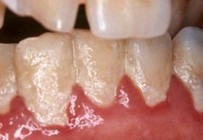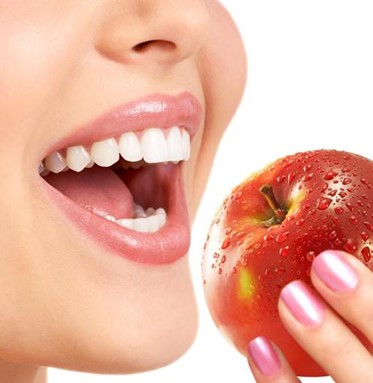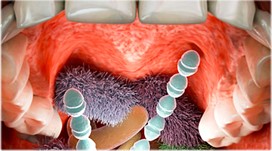Mouthing Off: A Dentist’s Role in Nutrition
 Peppermint
Peppermint Oral health is related to diet in many ways, for example, nutrition influences development, oral cancer and oral infectious diseases. Dental diseases impact considerably on self-esteem and quality of life and are expensive to treat.
But how many of us actually understand the concept that our physical health impacts our dental health and vice versa?
This post focuses on everyone’s favorite meal: dessert.
Initially, sugar was eaten raw as well as turned into molasses and rum. Soon we begin refining it as we were doing to wheat. White crystalline sugar quickly became a staple in the modern day diet until the mid 1970′s when we discovered an even cheaper source of refined sugar: corn. A process was created to extract the fructose from corn. From there, chemicals were added to alter its structure to become high fructose corn syrup.
In the 1930′s Dr Weston Price traveled the world studying the teeth and skulls of every primitive race he could find. His conclusions were never challenged and equally powerful. As these people were exposed to western foods, their health declined showing higher rates of tooth decay, arthritis, and TB. However, those that continued eating their simple, primitive foods, revealed a comparatively lower occurrence of tooth decay and degenerative diseases. Not only were their mouths left unscathed, so were their immune systems!
Digestion of carbohydrate begins in the mouth, with the secretion of the enzyme salivary amylase from the serous cells of the salivary glands. The enzymes secreted by the mouth mainly provide protection against bacteria and bacterial toxins. And what do bacteria eat? Carbs. Have you ever spilled ice cream? That surface becomes incredibly sticky. That stickiness is from the sugar content. Now, imagine that sticky coating on your teeth. How long do you think it takes for that sugar to be broken down by our saliva? What do you think gets to it first? And its all about supply and demand. The more carbs consumed, the more bacteria grow and thrive — and they have to live somewhere! Don’t forget, a cavity is a bacterial infection (more like invasion) of the tooth. The less carbs eaten, the less bacteria have to consume, thus a lower bacterial load in your mouth. Less plaque and cavities!
Good nutrition is essential for good physical health. Nutrition also plays a key role in the development and maintenance of a healthy mouth, especially the teeth and gums. The food we eat affects our teeth. At the same time, the health or lack of health of our teeth and gums affects what we can eat. Good dental health begins early in life and must be practiced throughout life.
Tooth development begins shortly after conception, usually between the sixth and eighth weeks of pregnancy and continues throughout the term. Slight nutritional deficiencies of the mother may cause changes in tooth structure in the child that will leave a tooth at greater risk for decay later in life. A good diet during pregnancy is always important.
However, nutrient excesses as well as nutrient deficiencies, may play a role in congenital anomalies of the mouth. Therefore, take supplements during pregnancy only on the advice of a doctor.
The most significant effect of nutrition on teeth is the local action of diet in the mouth on the development of dental caries and enamel erosion. Dental erosion is increasing and is associated with dietary acids, a major source of which is soft drinks. Main symptom? Hypersensitivity. To cold, especially.
Brushing after meals and snacks is one of the best ways to remove sugars and food particles from tooth surfaces. And please don’t forget to floss after you brush at bedtime!
The decay process begins when the bacteria that are always present in the mouth break down components of saliva. These components adhere to tooth enamel. This is the start of dental plaque.

Thick white sticky plaque on the teeth at the gums.
Inside this dental plaque, the bacteria ferment dietary carbohydrates for a food source. This fermentation produces lactic and other acids. These acids demineralize the tooth enamel. As the tooth demineralizes, bacteria move into the tooth, decay begins and a cavity is formed.
Untreated dental caries are painful and can result in tooth loss. Pain or loss of teeth may cause malnutrition. These conditions often prevent a person from chewing and eating adequate amounts, as well as eating some hard, high-fiber foods.
Once again, bacteria need carbohydrates for food. By cutting back on carbohydrates, the rate of dental caries can be reduced. Sucrose (table sugar) is the carbohydrate bacteria prefer. However, other simple carbohydrates, such as fructose, lactose and glucose, are easy to ferment and also support bacteria growth.
Simple sugars are found in many foods and have many names. Some of these are table sugar, corn syrup, honey, molasses and dextrose. By reading labels on food products, you can limit foods high in simple sugars and thus reduce the chance of dental caries.
Bacteria also can ferment complex carbohydrates (starches), but the process takes longer. However, many complex carbohydrates are sticky and become lodged between teeth and gums. This allows the bacteria time to ferment the carbohydrate. Meats and foods high in fiber, such as fresh fruits and vegetables, help clean the teeth of food particles and sugars during the chewing process. These foods promote saliva flow, which helps rinse the teeth of food particles. Saliva also neutralizes the acid.
To prevent cavities and maintain good oral health your diet — what you eat and how often you eat — are important factors. Changes in your mouth start the minute you eat certain foods. So, by changing your diet you improve the quality of your smile and your life!

Special thanks to the WHO and Tammy Davis.
 Peppermint
Peppermint





